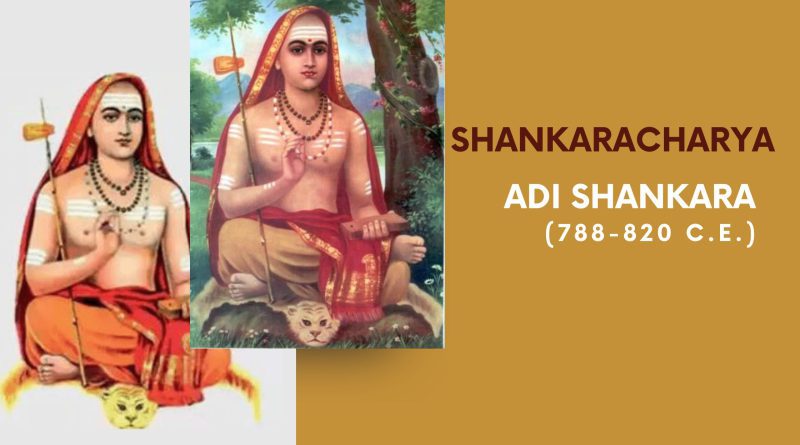Adi Shankara: Architect of Advaita Philosophy and Beacon of Spiritual Wisdom
Adi Shankara, a luminary of ancient India, stands as a colossus in the annals of philosophy, illuminating the path of knowledge and spirituality. Born in 788 C.E., his life and teachings echo through time, leaving an indelible mark on the tapestry of Indian sanskriti.
Philosophy and Ideology:
At the heart of Adi Shankara’s philosophy lies Advaita Vedanta – the concept of nondualism. His profound insights delved into the essence of reality, proclaiming that the ultimate truth is the indivisible oneness of the self (Atman) with the cosmic reality (Brahman).

Birth History and Significance in Indian Sanskriti:
Hailing from Kaladi in Kerala, Adi Shankara’s birth is shrouded in divine legend. His life was devoted to the revitalization of Sanatan Dharma, traversing the length and breadth of India to engage in scholarly debates and establish mathas (monastic institutions). His efforts aimed to preserve and propagate the spiritual heritage of the land.
Teachings and Preachings:
Adi Shankara’s teachings, encapsulated in commentaries on the Upanishads, Bhagavad Gita, and Brahmasutras, are a testament to his intellectual prowess.
He advocated the path of Jnana Yoga – the pursuit of knowledge – as a means to attain self-realization and liberation from the cycle of birth and death.
His compositions, such as the Vivekachudamani and Soundarya Lahari, delve into the nuances of devotion, wisdom, and the sublime beauty of the divine feminine.
Advaita Vedanta:
- Adi Shankara’s foremost teaching revolves around Advaita Vedanta, emphasizing the nondual nature of reality. He posited that the ultimate truth is the oneness of the individual soul (Atman) with the universal consciousness (Brahman). This teaching forms the bedrock of his philosophical contributions.
Maya and Illusion:
- Adi Shankara elucidated the concept of Maya, the cosmic illusion that veils the true nature of reality. He emphasized that the world we perceive is a product of Maya, and true knowledge lies in transcending these illusions to recognize the eternal and unchanging nature of Brahman.
“भज गोविन्दं भज गोविन्दं गोविन्दं भज मूढ़मते। सम्प्राप्ते सन्निहिते काले नहि नहि रक्षति डुकृङ्करणे॥”
– Adi Shankara
Jnana Yoga – Path of Knowledge:
- Adi Shankara advocated Jnana Yoga, the path of knowledge, as a means to attain self-realization. He stressed the importance of discerning between the transient and the eternal, encouraging seekers to delve into introspection, study scriptures, and engage in self-inquiry to realize the true nature of the self.
Bhaja Govindam:
- In his composition “Bhaja Govindam,” Adi Shankara imparts practical wisdom for leading a meaningful life. The verses emphasize the impermanence of material pursuits and the importance of cultivating devotion to Govinda (God) as a means to find inner peace and liberation.
Unity in Diversity:
- Adi Shankara’s travels across India and establishment of mathas aimed at fostering unity in the diverse spiritual traditions of the country. He recognized the underlying unity in the multiplicity of paths and emphasized that different spiritual practices are like tributaries merging into the same ocean of divine realization.
In an age marked by materialism and transient pursuits, Adi Shankara’s teachings offer a timeless refuge. His emphasis on self-realization and the pursuit of knowledge provides a roadmap for individuals seeking meaning beyond the ephemeral. The principles of Advaita Vedanta invite us to transcend the superficial divisions that often cloud our understanding of existence.
In the face of modern challenges, Adi Shankara’s advocacy for the unity of all beings becomes a poignant reminder of the interconnectedness that binds humanity. His teachings serve as a beacon, guiding individuals towards inner harmony and a holistic approach to life.
Adi Shankara’s legacy transcends the boundaries of time, resonating with those who seek a deeper understanding of life’s purpose. As we navigate the complexities of the modern era, his teachings stand as a timeless wellspring of wisdom, offering solace, direction, and a profound connection to the eternal truths that underpin our existence.
In honoring Adi Shankara, we not only pay homage to a revered sage but also embrace the enduring light of knowledge that continues to illuminate the path of self-discovery.
Om Shanti, Shanti, Shanti.





